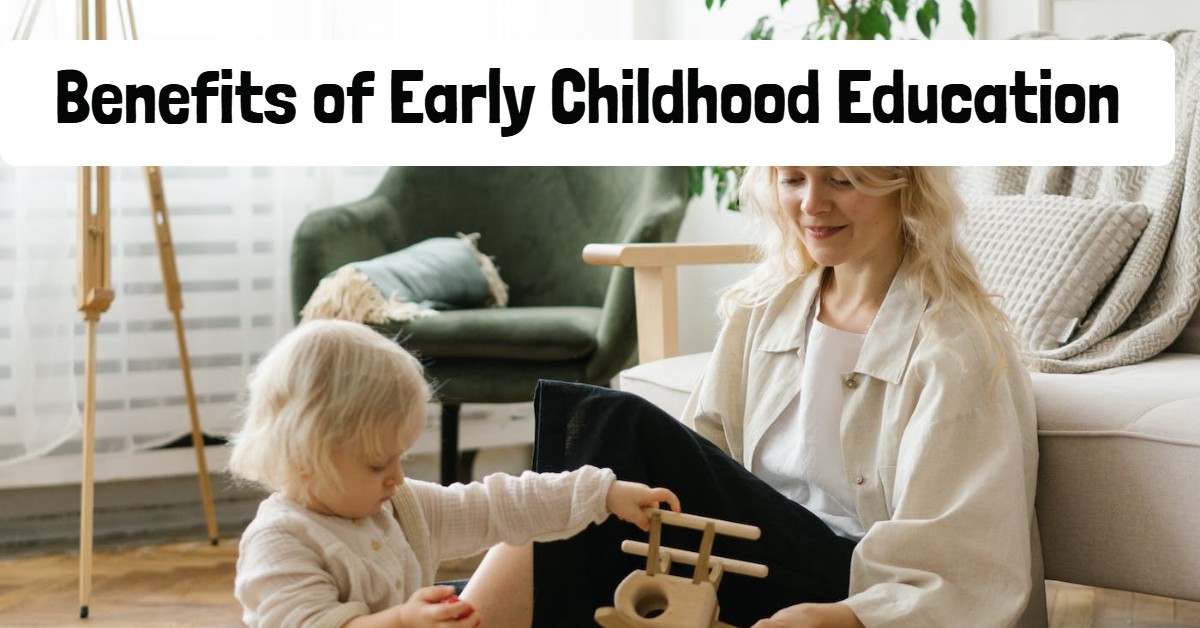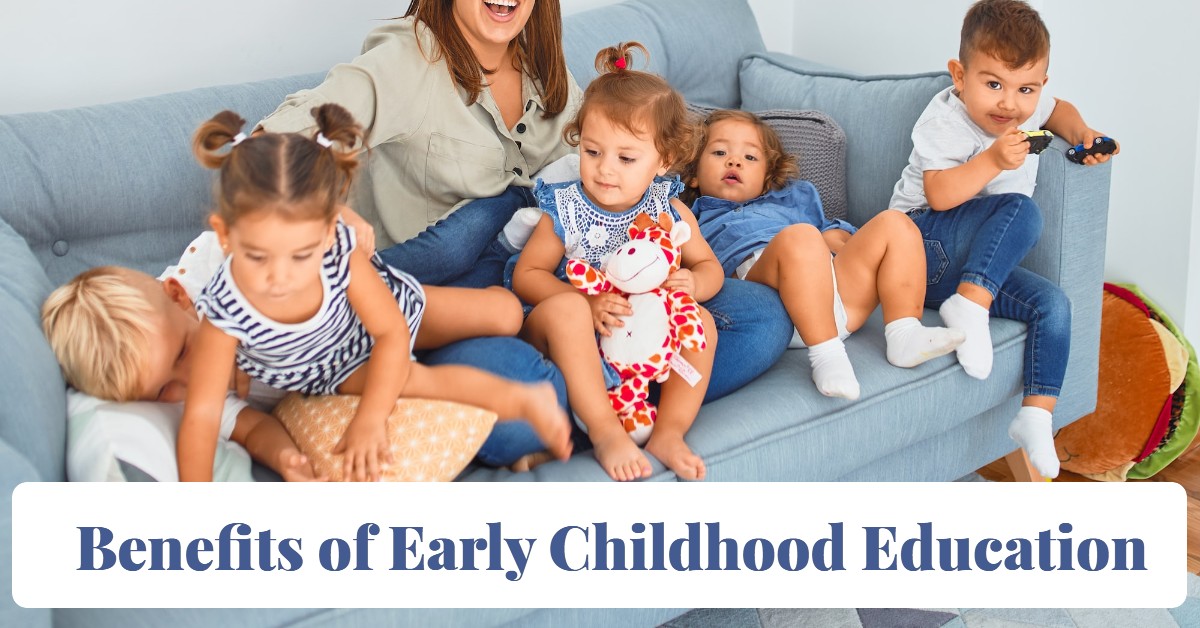Benefits of Early Childhood Education (12 Advantages)

Hey, there. Early childhood education is great. But what are the benefits of early childhood education? Find out below.

What is Early Childhood Education?
Early childhood education, often known as ECE, is a broad term that encompasses a variety of educational settings and activities that are geared towards young children, generally in the age range from birth to eight years old.
ECE includes a period of a child’s development that is extremely important. It is during this time that the child’s brain is quickly developing and establishing the groundwork for future learning and success.
Benefits of Early Childhood Education (FAQs & Answers)
How can early childhood education help my child unleash their inner Picasso?
Early childhood education fosters creativity and imagination through play-based learning, arts and crafts, and other creative activities. It provides your child with opportunities to express themselves, experiment with different materials, and develop their artistic skills.
Can early childhood education really teach my child to share and take turns without tantrums?
Early childhood education promotes positive social interactions and helps young children develop important social skills like sharing, taking turns, and conflict resolution. While tantrums may still happen occasionally, early childhood education can provide strategies and support to help your child navigate social situations more effectively.
How can early childhood education turn my picky eater into a budding foodie?
Early childhood education often includes nutrition education and opportunities for children to try new foods, fostering healthy eating habits and exposing them to a variety of flavors and textures. This can help expand their palate and develop a positive relationship with food.
12 Benefits of Early Childhood Education
What are the benefits of early childhood education?
The advantages of starting school at a young age are numerous and include the following:
1. Development of cognitive skills
Early childhood education provides opportunities for young children to develop cognitive skills such as language development, problem-solving, critical thinking, and early math and literacy skills. These skills serve as the building blocks for future academic success and are developed through play-based activities, hands-on learning experiences, and exposure to rich and stimulating environments.
2. Social and emotional development
Early childhood education promotes the development of social and emotional skills, including self-regulation, empathy, and social skills, such as sharing, taking turns, and cooperating with others. These skills are essential for healthy social interactions and relationships, and they form the basis for emotional well-being and mental health later in life.
3. Improved school readiness
Early childhood education prepares children for formal schooling by helping them develop the skills, knowledge, and behaviors necessary to succeed in a classroom setting. Children who participate in high-quality early childhood education programs are more likely to be ready for kindergarten, have better school attendance rates, and perform better academically throughout their school years.
4. Long-term educational and economic benefits
Research has shown that children who participate in early childhood education are more likely to graduate from high school, pursue higher education, and have higher earning potential in their adult lives. Early childhood education lays the foundation for a lifetime of learning and sets children on a trajectory toward success in their academic and professional pursuits.
5. Improved health outcomes
Early childhood education has been linked to improved health outcomes in children. It can help promote healthy habits such as proper nutrition, regular physical activity, and good hygiene practices, which can lead to better overall health and well-being throughout a child’s life.
6. Reduced achievement gaps
Early childhood education can help narrow the achievement gaps that exist among children from different socio-economic, racial, and ethnic backgrounds. Access to high-quality early childhood education can help level the playing field for all children and provide them with equal opportunities to succeed academically and socially.
7. Enhanced parent-child relationships
Early childhood education programs often involve parental involvement, which can strengthen the bond between parents and their children. It can also provide parents with resources and support to better understand their child’s development and provide a nurturing and stimulating home environment that complements their child’s early learning experiences.
8. Enhanced creativity and imagination
In the world of education, early childhood education is a crucial stage that lays the foundation for a child’s future academic and personal success. One of the key features of this stage is the emphasis on play-based learning, which not only fosters creativity and imagination but also promotes cognitive, emotional, and social development. Through play, children are able to explore their surroundings, experiment with different ideas, and engage with their peers in a fun and interactive way.
9. Long-term educational and economic benefits
According to recent research, enrolling children in early childhood education programmes can have a significant impact on their future success. Studies have found that those who participate in such programmes are more likely to complete high school, pursue further education, and ultimately earn higher salaries as adults.
10. Diversity and inclusion:
Early childhood education plays a crucial role in promoting diversity and inclusion among young children. Providing them with exposure to various cultures, languages, and experiences helps to instill in them a sense of acceptance, respect, and appreciation for diversity from an early age. This is a critical step in building a more inclusive society where people from all walks of life can come together and thrive.
11. Respect
Instilling the importance of respect for one’s peers through instruction. This entails not just regard for individuals and the things they own but also regard for their surroundings, both in the local and broader senses. There is no better place to acquire this virtue than in the chaotic setting of a preschool, where everything is shared, and civility and manners are both taught and learnt naturally. There is no other situation in which this virtue can be learned more effectively.
12. Resilience
Early childhood educators, parents, and carers must collaborate to help children develop resilience as soon as feasible. Children may learn how to control themselves and their emotions by providing a consistent, safe, fair social environment with clear expectations and predictable consequences.
It is the responsibility of the instructor to provide an environment that is both difficult and hands-on so that students may learn. They could occasionally get bumps, bruises, or lose a game, but this is the basis for developing coping mechanisms for more difficult situations in life.
Conclusion
In conclusion, early childhood education offers numerous benefits for young children, setting them up for success in various aspects of their lives.
It is an investment in their future, laying the groundwork for their academic success, emotional well-being, and personal growth. It is essential to recognize and prioritize the benefits of early childhood education, as it can have a lasting impact on a child’s development and future trajectory.
Recommended:
How to Succeed in College( All You Need to Know)
How to Have a Healthy Brain (Requirements)




